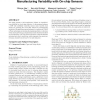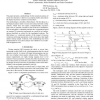101
Voted
DAC
1996
ACM
15 years 4 months ago
1996
ACM
1- A methodology is presented in this paper for determining an optimal set of clock path delays for designing high performance VLSI/ULSI-based clock distribution networks. This met...
81
Voted
ICCAD
1999
IEEE
15 years 5 months ago
1999
IEEE
This paper considers the problem of determining an optimal clock skew schedule for a synchronous VLSI circuit. A novel formulation of clock skew scheduling as a constrained quadrat...
104
Voted
DAC
2009
ACM
15 years 5 months ago
2009
ACM
We present an unconventional clock distribution that emphasizes flexibility and layout independence. It suits a variety of applications, clock domain shapes and sizes using a modu...
GLVLSI
2010
IEEE
15 years 5 months ago
2010
IEEE
This paper presents a self-compensation scheme of manufacturing variability for clock skew reduction. In the proposed scheme, a CDN with embedded variability sensors tunes variabl...
91
Voted
ISQED
2002
IEEE
15 years 5 months ago
2002
IEEE
This paper presents a methodology for the statistical analysis of clock tree structures. It allows to accurately predict and analyze the impact of process variation on clock skew....
88
Voted
GLVLSI
2010
IEEE
15 years 5 months ago
2010
IEEE
Clock skew variations adversely affect timing margins, limiting performance, reducing yield, and may also lead to functional faults. Non-tree clock distribution networks, such as ...
108
click to vote
ASPDAC
2005
ACM
15 years 6 months ago
2005
ACM
-In high performance systems, process variations and fluctuations of operating environments have significant impact on the clock skew. Recently, hybrid structures of H-tree and m...
ISQED
2005
IEEE
15 years 6 months ago
2005
IEEE
This paper discusses clock skew due to manufacturing variability and environmental change. In clock tree design, transition time constraint is an important design parameter that c...
96
Voted
ISPD
2006
ACM
15 years 6 months ago
2006
ACM
Advances in VLSI technology make clock skew more susceptible to process variations. Notwithstanding efficient zero skew routing algorithms, clock skew still limits post-manufactu...
DATE
2006
IEEE
15 years 6 months ago
2006
IEEE
—The clock distribution network is a key component of any synchronous VLSI design. High power dissipation and pressure volume temperature-induced variations in clock skew have st...






